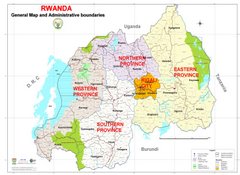By James Munyaneza
Sunday, 09 April 2006
Ignace Murwanashyaka, the leader of the Democratic Forces for the Liberation of Rwanda (FDLR) was yesterday arrested from Germany, sources told The New Times, Friday 7. The sources say the militia leader was arrested by German police on instructions of the Federal Republic of Germany. The arrest follows Murwanashyaka’s cancellation of his presence at a planned FDLR meeting in Kampala, which reports say is slated for between April 8 and 14. He flew to the European nation on April 5 through Uganda’s Entebbe International Airport, according to reports.
The sources further said that Murwanashyaka, who had arrived in Uganda on April 4 from his DRC bases via Buramba border post, left for Germany aboard SN Brussels on the evening of April 5 under the facilitation of both Kampala and the UN Mission in Congo (MONUC).
An official at the offices of SN Brussels in Kampala confirmed Murwanashyaka was among passengers that travelled that day with SN Brussels Flight No. 481.
Murwanashyaka’s free movements were in violation of last year’s UN Security Council’s travel ban slapped on him along with many other militia leaders in the Great Lakes Region.
The information is corroborated by correspondences between MONUC and the office of the Permanent Mission of Germany to the United Nations, which referred to Murwanashyaka’s trip before the day of the flight.
“In its Notes Verbales, MONUC informed the Government of the Federal Republic of Germany that Murwanashyaka is expected to return to his residence in Germany via Uganda,” the Permanent Mission of Germany, said in a note dated March 03, 2006.
However, the Mission warned that Murwanashyaka would not be allowed to enter Germany.
“The Permanent Mission of Germany thanks MONUC for providing this information and wishes to inform that appropriate measures were taken by the competent German authorities aiming to prevent Dr Murwanashyaka’s re-entry to Germany,” the German Mission said in the Note Number 156/2006, whose copy The New Times obtained.
Murwanashyaka holds a German passport and lived in Germany shortly after the 1994 Genocide before going to the DRC to lead a rebellion against Kigali. Sources say he also uses a Ugandan passport.
An intelligence source said the rebel leader had wished to travel back to Germany since last year but had since been limited by the travel ban. Besides the travel restrictions, the FDLR chief also had his assets frozen.
On Friday, The New Times published a story indicating that Murwanashyaka crossed to Uganda on April 4 and spent a night at a pastor’s home in Kihihi in Kanungu district, home to Uganda’s Defence Minister Amama Mbabazi.
Reports indicated that Murwanashyaka was going for a meeting between FDLR officials and senior army chiefs of Uganda People’s Defence Forces (UPDF) in Kampala.
A host of senior military and civilian FDLR officials are said to be living in the Ugandan capital and in possession of official Ugandan passports. Most of them acquired new names to disguise their identity.
Meanwhile, contrary to earlier reports that FLDR’s First Division Second-in-Command, one Lieutenant Colonel Karume, had returned to the rebels’ stronghold inside the Congo after escorting Murwanashyaka to the Ugandan border, the officer is now reported be in Kampala, ostensibly to attend the said meeting. Sources say that Lt. Col. Karume’s wife also stays in the Ugandan capital.
The continued reports of Rwandan rebels using Uganda’s territory to hatch up anti-Rwanda plans and about their meetings with top Ugandan officials are a threat to the badly strained relations between the two former allies.
Since the two nations’ armies engaged in three bloody clashes between themselves in Kisangani, DRC, in 1999 and 2000, there have been counter-accusations from both sides, with claims that they were habouring and aiding each other’s rebels.
Monday, April 10, 2006
Subscribe to:
Post Comments (Atom)
Rwanda

Administrative map
Blog Archive
-
►
2010
(59)
- ► 09/19 - 09/26 (1)
- ► 07/11 - 07/18 (5)
- ► 07/04 - 07/11 (5)
- ► 06/27 - 07/04 (4)
- ► 06/20 - 06/27 (6)
- ► 06/06 - 06/13 (17)
- ► 05/30 - 06/06 (4)
- ► 03/28 - 04/04 (2)
- ► 02/28 - 03/07 (3)
- ► 02/21 - 02/28 (5)
- ► 01/24 - 01/31 (2)
- ► 01/17 - 01/24 (4)
- ► 01/10 - 01/17 (1)
-
►
2009
(25)
- ► 11/08 - 11/15 (9)
- ► 10/04 - 10/11 (2)
- ► 01/25 - 02/01 (2)
- ► 01/18 - 01/25 (12)
-
►
2008
(55)
- ► 12/28 - 01/04 (1)
- ► 12/21 - 12/28 (11)
- ► 12/14 - 12/21 (3)
- ► 12/07 - 12/14 (5)
- ► 11/30 - 12/07 (2)
- ► 11/16 - 11/23 (22)
- ► 11/09 - 11/16 (4)
- ► 07/13 - 07/20 (1)
- ► 06/01 - 06/08 (6)
-
►
2007
(19)
- ► 05/20 - 05/27 (2)
- ► 04/01 - 04/08 (1)
- ► 03/04 - 03/11 (1)
- ► 02/25 - 03/04 (2)
- ► 02/18 - 02/25 (2)
- ► 02/11 - 02/18 (6)
- ► 02/04 - 02/11 (3)
- ► 01/28 - 02/04 (2)
-
▼
2006
(59)
- ► 10/22 - 10/29 (12)
- ► 10/15 - 10/22 (1)
- ► 10/08 - 10/15 (2)
- ► 09/03 - 09/10 (2)
- ► 08/27 - 09/03 (6)
- ► 07/09 - 07/16 (7)
- ► 06/18 - 06/25 (1)
- ▼ 04/09 - 04/16 (5)
- ► 04/02 - 04/09 (23)
No comments:
Post a Comment